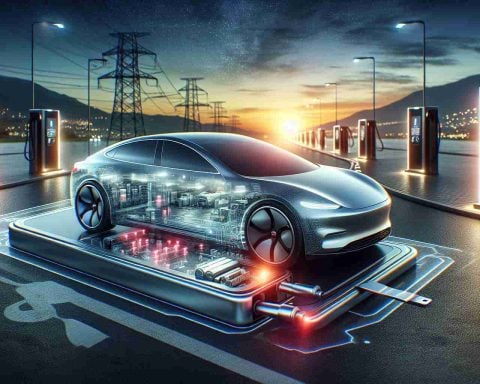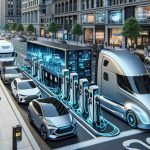- Michigan halts its EV charging station expansion plans amid federal uncertainty.
- The National Electric Vehicle Infrastructure (NEVI) Program is paused, affecting $110 million investment plans.
- Concerns rise among EV owners about charging reliability and future infrastructure.
- Auto analysts warn of a vicious cycle: fewer EV purchases lead to less investment in charging networks.
- Inconsistent government policies challenge both consumers and automakers in the electric vehicle market.
- The need for a stable and reliable charging network has become increasingly urgent for EV adoption.
In a shocking turn of events, Michigan has put the brakes on its ambitious plan to expand public electric vehicle (EV) charging stations. This decision comes as the new leadership in the U.S. Department of Transportation pauses the National Electric Vehicle Infrastructure (NEVI) Program, initially set to unleash $110 million in investment to build 100 charging stations by 2026.
Michigan’s Department of Transportation recently announced that, effective immediately, they are halting further funding applications due to uncertainty surrounding federal support. This news has sent ripples of concern through the EV community, leaving drivers anxious about the future of charging infrastructure.
Electric vehicle owner Gigi Jones, who recently bought a Tesla, expressed her frustration and fear over the unreliable charging options. After nearly running out of battery during a drive in wintry conditions, she revealed that relying on government initiatives was a crucial factor in her decision to go electric.
As the market slows and charging options dwindle, auto analysts warn of a vicious cycle. With fewer consumers purchasing EVs due to insufficient infrastructure, manufacturers may hesitate to invest in expanding charging networks without stable public funding.
The inconsistency of government policies not only impacts EV owners but poses significant challenges for automakers who have poured resources into developing electric vehicles. Without a robust charging framework in place, the ambition to make electric vehicles mainstream hangs in the balance.
The takeaway? As Michigan’s plans falter, EV drivers and the automotive industry face an uncertain future, pushing the urgency for a reliable charging network to the forefront of the electric vehicle revolution.
Shocking Halt: Michigan’s EV Charging Expansion Faces Major Setback
Michigan’s Halt on EV Charging Station Expansion: What You Need to Know
In a surprising development, Michigan has placed a hold on its ambitious plan to expand electric vehicle (EV) charging stations. The move comes after the new leadership at the U.S. Department of Transportation has paused the National Electric Vehicle Infrastructure (NEVI) Program, which was designed to allocate $110 million to build 100 charging stations by 2026. This decision raises significant concerns about the future of EV infrastructure in Michigan and potentially across the nation.
# New Insights and Relevant Information
– Market Impact on EV Sales: Analysts predict that the slowdown in charging infrastructure will likely lead to decreased EV sales. A lack of charging stations makes potential buyers hesitant, leading to a shrinkage in the market demand.
– State-Level Initiatives: Michigan could seek to implement state-supported charging networks to fill the gap left by federal indecisiveness, promoting private investment and partnerships to enhance infrastructure.
– Long-term Predictions: If the funding for the NEVI program remains stalled, we might see a longer-than-expected transition to an electrified transportation system, pushing back timelines for when EVs become mainstream.
– Consumer Sentiment: The uncertainty is shaking consumer confidence. As reported by several EV owners, unreliable charging options are causing a significant concern, which could lead to overall dissatisfaction with the electric vehicle experience.
– Comparison to Other States: Other states, such as California and New York, are forging ahead with their own EV charging expansions. Their diverse strategies could serve as a roadmap for Michigan if they choose to pivot in response to the halted NEVI actions.
# Related Questions
1. What is the NEVI Program and why is it significant?
The NEVI (National Electric Vehicle Infrastructure) Program aims to provide funding for building a nationwide network of EV charging stations, further supporting the transition to electric vehicles and bolstering consumer confidence in adopting EV technology.
2. How might Michigan’s decision affect EV adoption in the U.S.?
Michigan’s slowdown in infrastructure development could dampen enthusiasm for EVs across the country. A well-established charging infrastructure is crucial for encouraging consumers to enter the EV market, and other states might follow suit if federal support remains unclear.
3. What are the potential solutions to the charging infrastructure problem?
Some potential solutions include increased investments from private companies, state-funded initiatives, and public-private partnerships, which could help to circumvent the current federal funding obstacles.
For more information about electric vehicles and charging infrastructure, visit Energy.gov.



















